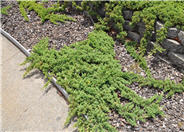
Common name:Dwarf Japanese Garden Juniper
Botanical name:Juniperus procumbens 'Nana'
The very dense growth of this plant is highlighted by foliage of a bluish green color. Its growth habit is very low, spreading, and mound-like, resembling a natural bonsai. This variety is one of the best Junipers for small garden spaces. Junipers are highly combustible plants.
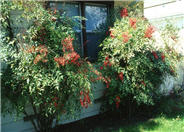
Common name:Nandina, Heavenly Bamboo
Botanical name:Nandina domestica
Nandina domestica is a graceful upright shrub that grows from 3'-6' in height. It gets its name from its bamboo-like growth habit. When thinned from the center it bears a remarkable resemblance to bamboo. It is best used in groups. It can be used in a shaded patio or out in a shrub border with full sun. An interesting feature of Heavenly Bamboo is the bronze color in the new growth when planted in full sun. It also bears clusters of white flowers in the spring.
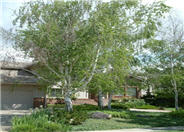
Common name:White Birch, European White Birch
Botanical name:Betula pendula
This medium-size weeping tree will grow to about 40' tall and has a whitish/brown bark with deciduous green leaves.
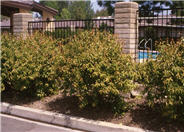
Common name:Xylosma
Botanical name:Xylosma congestum
This medium sized, mounding evergreen shrub with lustrous yellow green foliage produces new growth that is tinted rosy red. It has a growth habit that is loose, graceful and spreading.
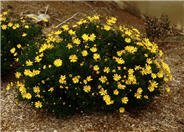
Common name:Green & Gold Euryops
Botanical name:Euryops pectinatus 'Viridis'
As a small perennial shrub with 2" wide, bright yellow, daisy-like flowers, blooms on this plant are seen seen almost year round. Its foliage is green in color. It is not as tolerant of coastal situations and it also seems to be more tender to frost.
Compost for Healthy Soil and Plants
The natural world works in cycles. Everything is changing form and moving from place to place in an endless energy exchange system. The leaves and twigs that fall to the ground, not to mention other life forms that might die, decompose and combine with water, air and minerals of the soil to create a medium for future plants.
Click in the green box for more information
| Designer: | Juniper Drapery |
Photographer: GardenSoft |
Soils and Compost:
Physical weed control, including mulching, or hand removal protects the watershed from harmful chemicals.
Water Saving Tip:
Adjust sprinklers to avoid watering sidewalks and driveways.
Integrated Pest Management:
Remove irrigation water and fertilizer from areas where you don't want weeds to grow.

